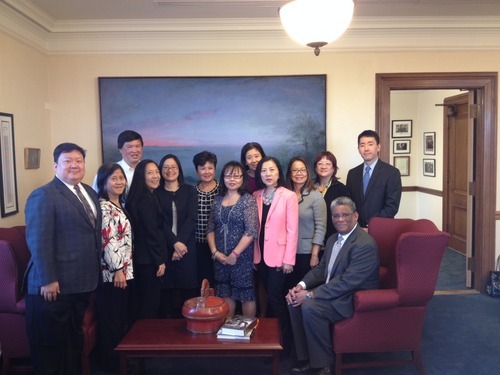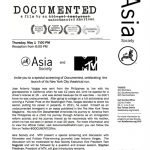Meet AAJANY: Asian American Judges Association of New York

(Pictured above, left to right: Hon. Gilbert Hong, Hon. Marilyn Go, Hon. Denny Chin, Hon. Pamela Chen, Hon. Lillian Wan, Hon. Lorna Schofield, Hon. Doris Ling-Cohan, Hon. Kiyo Matsumoto, Hon. Toko Serita, Hon. Lydia Lai, Hon. Laurie Lau, Hon. Leslie Purificacion (seated), Hon. Dean Kusakabe)
On April 23, 2014, the newly formed Asian American Judges Association of New York (AAJANY) met with their Asian American colleagues on the federal bench and were hosted by the Honorable Denny Chin, Second Circuit Judge, for a tour of the courthouse. They later convened for dinner at Forlini’s to discuss common issues.
AAJANY was formed to address issues affecting Asian American judges, staff, and litigants in the state courts, to promote more diversity amongst the bar and the judiciary, and to advance the inclusion of judges of Asian descent at all levels of the state court system.
Three of those attending are also officers of the NAPABA Judicial Council (a national organization of state and federal judges of Asian descent): Hon. Doris Ling-Cohan (President), Hon. Denny Chin (Treasurer), and Hon. Marilyn Go (Secretary).
AAJANY is sponsoring the event, “How to Become a State Court Judge – from an APA perspective,” on April 29, 2014, 6pm, at the New York County Lawyers’ Association (NYCLA), 14 Vesey Street. Registration has closed but feel free to attend as a walk-in. Click here for more info.
Press Release: Asian American Bar Association of New York Support of Joint Statement on Comfort Women Issue & City of Glendale, CA
NEW YORK – April 25, 2014 – The Asian American Bar Association of New York (“AABANY”) announces its support of the Joint Statement on Comfort Women Issue regarding the City of Glendale, California’s approval of a public memorial commemorating the more than 200,000 Asian and Dutch women coerced into sexual slavery by the Imperial Armed Forces of Japan between 1932 and 1945.
“AABANY fully supports the Joint Statement on Comfort Women Issue issued on April 21, 2014 by organizations including (but not limited to) the Council of Korean Americans (CKA), the Korean American Bar Association of Washington, D.C. (KABA-DC), the Asian Pacific American Lawyers Association of New Jersey (APALA-NJ), the Filipino American Lawyers Association of New York (FALANY), and the Korean American Lawyers Association of Greater New York (KALAGNY),” said AABANY President Clara Ohr. “The public memorial approved by the City of Glendale, California is an important tribute to the thousands of women who suffered immeasurable humiliation, pain, and suffering during Japan’s colonial and wartime occupation of Asia and the Pacific Islands. By educating current and future generations of the gross injustices these women suffered, the City of Glendale Comfort Women Memorial may even have a role in helping to prevent a repeat of such tragic history.”
The full text of the Joint Statement is as follows.
The Korean American Bar Association of Washington, D.C. (KABA-DC), Filipino American Lawyers Association of New York (FALANY), Pan Asian Lawyers of San Diego (PALSD), the Asian Pacific American Lawyers Association of New Jersey (APALA-NJ), Orange County Korean American Bar Association (OC KABA), Korean American Lawyers Association of Greater New York (KALAGNY), Korean American Bar Association of Chicago (KABA-Chicago), Korean American Bar Association of Georgia (KABA-GA), Korean Community Lawyers Association (KCLA), Korean American Bar Association of San Diego (KABA-SD), Korean American Bar Association of Northern California (KABANC), Korean American Civic Action Committee, and the Council of Korean Americans (CKA) are deeply appreciative of the Glendale City Council’s support for and approval of a public monument in memory of the more than 200,000 Asian and Dutch women who were coerced into sexual slavery by Imperial Armed Forces of Japan between 1932 and 1945 (the “Comfort Women Monument”).
These women suffered unimaginable violence and brutality. Many have died; many near the end of their lives. It is important to remember what happened to them. They were victims, along with many others, of Japanese militarism and colonialism.
The suffering of these women, sometimes called “comfort women” after a Japanese euphemism for them, is a historical fact. As the U.S. House of Representatives said in H.R. 121: “[T]he Government of Japan, during its colonial and wartime occupation of Asia and the Pacific Islands from the 1930s through the duration of World War II, officially commissioned the acquisition of young women for the sole purpose of sexual servitude to its Imperial Armed Forces.” These women “suffered gang rape, forced abortions, humiliation, and sexual violence resulting in mutilation, death, or eventual suicide in one of the largest cases of human trafficking in the 20th century.” This resolution, which was adopted unanimously by the House of Representatives, was written and sponsored by Congressman Mike Honda of California.
We deplore the filing of a lawsuit in Federal district court that seeks the removal of the Comfort Women Monument. We are especially saddened by the representation of the plaintiffs in that lawsuit by Mayer Brown, a well-respected international law firm. The Complaint written by Mayer Brown lawyers refers to the comfort women as women “who were recruited, employed, and/or otherwise acted as sexual partners” of Japanese soldiers, without any acknowledgement of the violence committed against them. The Complaint goes on to argue that the actions of the Glendale City Council violate the United States Constitution. We cannot see how it could responsibly be argued that the approval of a memorial to the victims of wartime sex trafficking could be an unconstitutional act.
We also condemn those who would use the comfort women issue as an excuse to attack the Japanese American community. It is irresponsible to blame Japanese people generally, and especially irresponsible to blame Japanese Americans, for what happened during the World War II era. The actions at issue were taken 80 years ago by officials of the Japanese government.
George Santayana noted that “those who cannot remember the past are condemned to repeat it.” We applaud the Glendale City Council’s act of remembrance. We hope that by facing historical truths we can avoid the tragic mistakes of the past and strive for a more just and humane world. Please contact Yule Kim of KABA-DC at [email protected] for more information.
For more information, please contact Simone Nguyen, AABANY Program Associate, at (718) 228-7206, or direct any inquiries to [email protected].
The Asian American Bar Association of New York is a professional membership organization of attorneys concerned with issues affecting the Asian Pacific American community. Incorporated in 1989, AABANY seeks not only to encourage the professional growth of its members but also to advocate for the Asian Pacific American community as a whole. AABANY is the New York regional affiliate of the National Asian Pacific American Bar Association (NAPABA).
###
Additional information about AABANY is available at www.aabany.org
Follow our blog at www.blog.aabany.org
Follow us on Twitter at www.twitter.com/aabany
Find us on Facebook at www.facebook.com/aabany
Find us on LinkedIn at www.linkedin.com/in/aabany
Press Release: Executive Director Yang Chen Honored at Binghamton University Alumni Association’s Special Recognition Awards
NEW YORK, NY – Thursday, April 24, 2014 – The Asian American Bar Association of New York (“AABANY”) is pleased to announce its Executive Director, Yang Chen, will be receiving one of the Binghamton University Alumni Association’s Medals of Distinguished Service. A graduate of the Class of 1987, Yang Chen will be honored among many other esteemed alumni at the 2014 Special Recognition Award Ceremony on Saturday, April 26, 2014. Binghamton University presents these awards to recognize volunteerism at the University and excellence in professional endeavors.
Yang serves as a mentor and role model to countless young attorneys and Binghamton alumni by assisting in establishing network connections between Binghamton alumni and professionals in various fields, Yang has taken on the role of strengthening the bonds between our communities.
“AABANY is pleased to congratulate our Executive Director Yang Chen on this well-deserved recognition,” said AABANY President Clara Ohr. “From his work in AABANY and beyond, Yang dedicated himself to giving back to whatever community he touches, whether it be his alumni network, the Asian American legal community, or any of the other communities that AABANY serves. Yang’s path from private legal practice to non-profit service has made him a unique role model, so we applaud Binghamton University on their selection and congratulate Yang on joining an exemplary and inspiring group of Binghamton alumni.”
For more information, please contact Simone Nguyen, AABANY Program Associate, at (718) 228-7206, or direct any inquiries to [email protected].
The Asian American Bar Association of New York is a professional membership organization of attorneys concerned with issues affecting the Asian Pacific American community. Incorporated in 1989, AABANY seeks not only to encourage the professional growth of its members but also to advocate for the Asian Pacific American community as a whole. AABANY is the New York regional affiliate of the National Asian Pacific American Bar Association (NAPABA).
###
Additional information about AABANY is available at www.aabany.org
Follow our blog at www.blog.aabany.org
Follow us on Twitter at www.twitter.com/aabany
Add us on Facebook at www.facebook.com/aabany
Add us on LinkedIn at www.linkedin.com/in/aabany/


